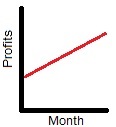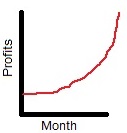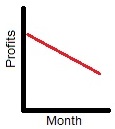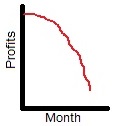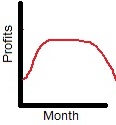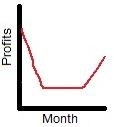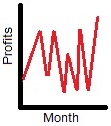When describing graphs and charts in English, there are many different verbs you can use to talk about trends. Here is my ultimate guide to the vocabulary we use for this, which is excellent for presentations on financial performance or financial projections. If you type any of these phrases into Google and click on ‘news’, you will see these phrases used daily for reporting on stocks, finance, currencies.
These phrases can also be used to describe changes in someone’s level of performance or workload, so they can be used much for a much wider range of situations than just finance:
Profits Increasing
‘Profits are rising’
‘Profits are climbing’ (I feel that this one is better for more long-term, slower increases)
‘Profits are going up’
If it is a bad thing that is increasing, such as debt or the crime rate, you can use the following:
‘Debts are mounting’ or ‘debts are mounting up’
Profits Increasing Quickly
‘Profits are rocketing’ or even more dramatic: ‘profits are skyrocketing’
‘Profits are taking off’
‘Profits are leaping’ (the verb’to leap’ literally means to jump at a great height or distance)
‘Profits are soaring’ (the verb ‘to soar’ literally means to fly high in the air – ‘the bird soared above its prey’)
Profits decreasing
‘Profits are falling‘ (this also works well as a noun – ‘there has been a fall in profits’)
‘Profits are dropping off’
‘Profits are sliding’ (‘to slide’ literally means to move quickly along or down a surface, ‘he slid on the ice’)
‘Profits are going down‘
Profits decreasing quickly
‘Profits are plummeting‘
(‘to plummet’ literally means to fall quickly from a high position – ‘he plummeted through the air’)
‘Profits are in free-fall’
‘Profits are taking a nosedive’
(‘a nosedive’ in its literal meaning is when a plane falls through the sky with its nose pointing down)
‘Profits are tumbling’ or ‘Profits have taken a tumble’
(‘to tumble’ literally means to fall to the ground, especially in a non-graceful way – ‘he tumbled down the stairs’)
In the past tense or the present perfect tense you can also use:
‘Profits slumped’ / ‘profits have slumped’
(the verb ‘to slump’ literally means to sit or lean is a very lazy , heavy way – ‘He slumped on the sofa’)
For short but sudden decreases you can also say:
‘Profits have dipped‘
Profits going up and down:
When profits increase, then stay the same for a long time, and then start decreasing again you can say:
‘Profits have plateaued‘
(in its literal meaning, a ‘plateau’ is an area of level, very high ground, which from a distance looks similar to the shape that you can see in the graph)
When profits rise and then fall again soon after, you can say:
‘Profits have peaked‘ or ‘Profits have hit their peak‘
(in its literal meaning, ‘a peak’ is the sharp top of a mountain, which matches the shape of the graph when profits go up and then suddenly decrease again)
When profits fall to a very low point, and then rise again you can say:
‘Profits have bottomed out’
‘Profits have hit rock bottom’ These phrases can be seen as the opposite of ‘profits have peaked’
When profits begin to slowly rise again after they have been really low, we can say:
‘Profits are picking up’
When profits are slowly decreasing to zero, you can say:
‘Profits are drying up’
When profits are going up and down quickly and unpredictably, you can use:
‘Profits are fluctuating’
If we want to make this sound more extreme and completely unpredictable, we can also say:
‘The situation on the market is very volatile’
When profits become stable after going up and down, or after any rise or fall, you can use:
‘Profits have stabilized’ (‘to stabilize’ literally means to become stable again)
‘Profits have leveled off’
Now you have all the vocabulary tools you need, it’s time for the grammar! Check out part 2: ‘Sales increase’ or ‘sales are increasing’? My ultimate guide to describing business graphs and charts in English. Part 2: Tenses
If you would like to have any of these words explained further, or if you would like to see some more examples, feel free to email me at [email protected], or message me on Skype at live:fluencyspace! Also if you have any other questions about English I’m happy to answer your emails or I will write a post about it, keep the emails coming! Check out more useful business vocabulary here!
David Cox
Fluency Space
Make the world your fluency space. Business English for career and life success
Did you enjoy this article? Follow me on Linkedin!
[addthis tool=addthis_horizontal_follow_toolbox]

